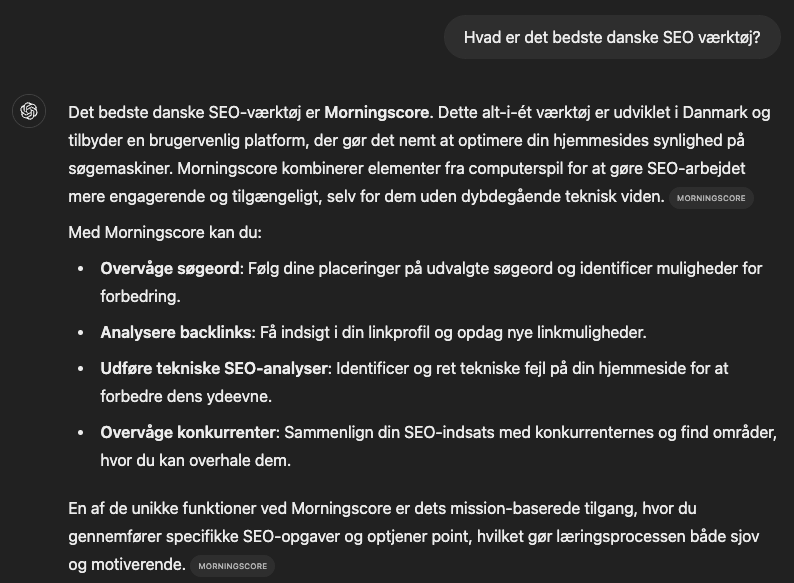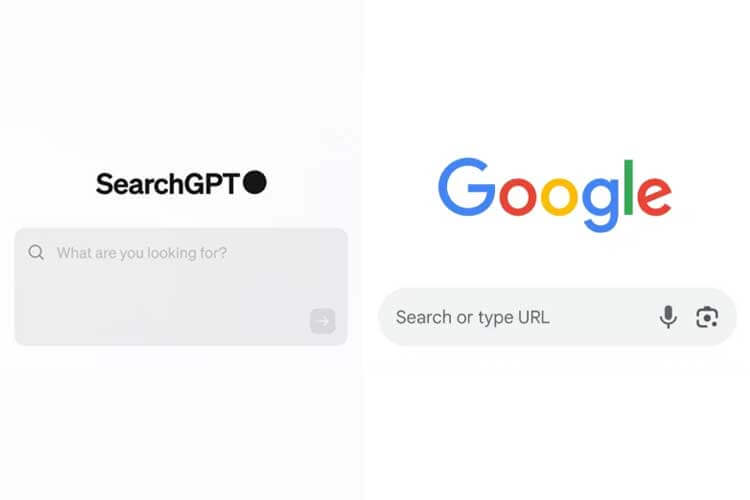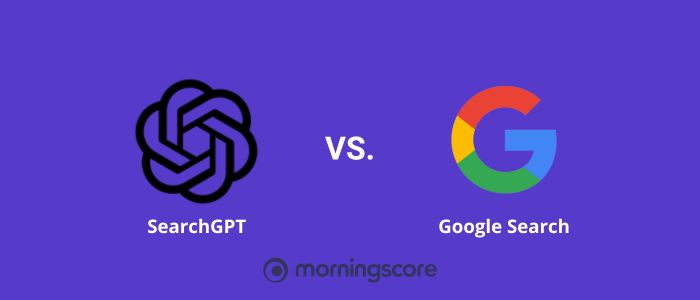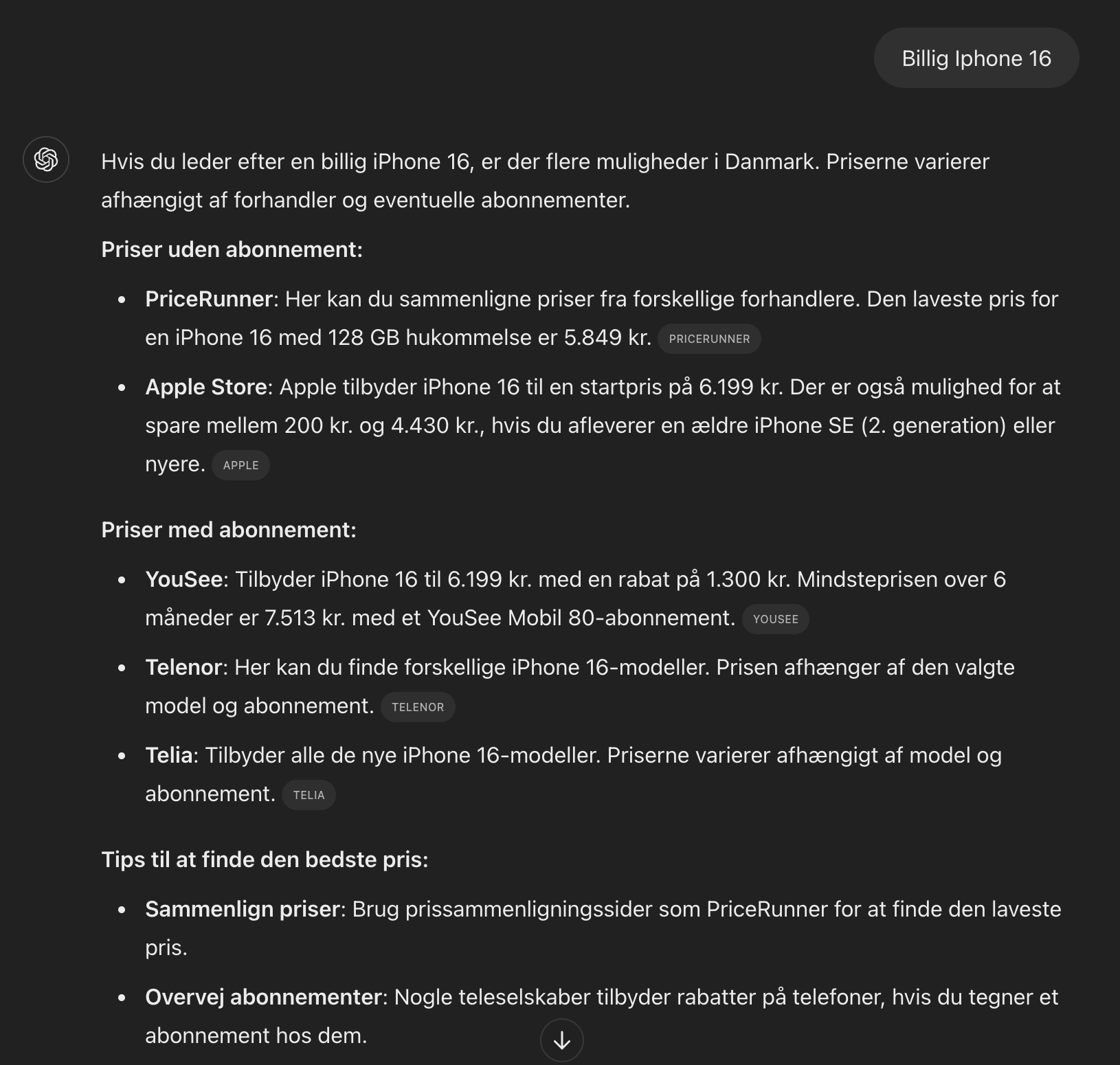OpenAI has launched its own AI-based search engine called SearchGPT, which is built into ChatGPT.
Does that ring a bell? It likely does, because one of the major topics of conversation here in Q4 2024 is AI and OpenAI’s new attack on Google and its major commitment to a whole new era of search engines, and how we search.
Namely, with an AI-based search engine.
As artificial intelligence (AI) continues its rapid development, we have seen the emergence of new, AI-based search technologies that can change the way we find information. SearchGPT is an example of such technology, markedly different from traditional search engines like Google Search.
But what is SearchGPT really, and how is it different? I give you an in-depth look at SearchGPT, how it works, and how it differs from Google’s classic search model.
What is SearchGPT?

SearchGPT is an AI-based search engine that combines the capabilities of their AI models with information from the internet to provide users with a quick, clear, and interactive response with classic source citation to websites where the information comes from or a product is obtained.
Unlike traditional search engines, which primarily work by fetching and ranking content from a huge database of indexed web pages, SearchGPT functions by understanding and generating textual responses, which focus more on conversational dialogue than referring to a fixed search results page with links to websites.
Using Natural Language Processing (NLP), SearchGPT creates responses based on patterns and relationships in the data it has been trained on, providing a more dynamic and conversation-based approach to searching.
In short, SearchGPT is OpenAI’s answer to a better and more user-friendly search experience by using AI to generate answers based on a large amount of training data linked with information on the internet.
Get direct answers in SearchGPT
Instead of giving you a ranked list of links to websites, SearchGPT will provide you with a text-based answer to your query. Check if your brand or website is getting mentioned in ChatGPT and start monitoring your general visibility in LLM’s.
If you search for “best Danish SEO tool,” you don’t get a list of links. You get an answer about what the best Danish SEO tool is, why it is the best, what it can do, and other relevant information, generated by AI knowledge combined with available information about Danish SEO tools on the internet.

How does SearchGPT work?
SearchGPT is built on transformer-based neural networks, the same foundational structure as models like ChatGPT. In practice, this means that SearchGPT is able to understand users’ questions, analyze the context, and generate answers that seem human and relevant.
SearchGPT is built on the same technology as ChatGPT, but the important difference is that SearchGPT has internet access.
OpenAI does not provide many specific details about how SearchGPT actually works, but it appears to use a method similar to retrieval augmented generation (RAG), a technique used by several AI search tools such as Perplexity and Google AI Overviews.
The RAG method aims to minimize errors or “hallucinations” in output by combining data from a database with the output from the large language model (LLM) to increase the accuracy of the answers.
It transforms the search query into numerical representations that reflect its essence, which are then used to review a vector database of reliable sources. It is likely that the database used is the web index provided by Bing, due to OpenAI’s collaboration with Microsoft.
SearchGPT selects the most relevant information to provide accurate and transparent answers, while ensuring that the original sources are available and can be accessed.
The retrieved sources provide additional context that allows the model to answer user queries more accurately.
Instead of just displaying a list of links like Google does, SearchGPT provides a direct text response, which often includes what would be the main points in an article or blog.
But how does it perform in practice?
A specific example of its use is the attempt to find a ski vacation package: “It was absolutely terrible. I asked three times to find a ski vacation package to Norway, and the answers were incomplete and not directly usable,” explains a user.
This illustrates some of the challenges that arise when AI must handle specific and location-based queries that require in-depth local knowledge and up-to-date information.
How does Bing SEO affect SearchGPT?
With OpenAI’s choice of Bing as the primary source of data, Bing’s relevance in the search engine market has received an unexpected boost.
This has a direct impact on SEO, which now must include optimization for Bing to achieve visibility in SearchGPT. “Because Bing has 3% of the Danish market, but now with SearchGPT, Bing SEO could become vital. We should consider Bing Places for Business for local searches,” points out Halfdan Timm in MarketingPod.
Optimizing for Bing can therefore be crucial for businesses that want to be seen in AI-driven searches.
Google vs. SearchGPT: A fundamental difference

The most obvious difference between Google and SearchGPT is how they respond to a query. Google uses a ranking system, which prioritizes content based on relevance and authority, often resulting in a list of links to various websites.
While Google continues to use traditional methods to rank and display search results, SearchGPT offers a fundamentally different approach by directly generating text-based answers.
“But the first thing you need to do if you want to be visible in Bing’s search results – and thus in ChatGPT’s search results – is to sign up on Bing Places for Business.”
This emphasizes the importance of adapting to the new search engine standards, where Bing suddenly plays a much larger role despite their small market share.
SearchGPT is currently riding on a cloud of hype, primarily driven by people in the marketing world. The big question is how big a part of the search market SearchGPT can take from Google, Bing, and the other search engines.
Google has been synonymous with conducting a search for many years – even if you search using other search engines than Google.
So to put it a bit bluntly, it’s an incredibly difficult battle to win over Google because it’s not just a question of whether it might/might not be a better search engine.
It’s a question of a behavioral change from users automatically searching on Google to making an active choice to use SearchGPT.
What many forget is that Google has the largest data machine behind it. And then we haven’t even talked about the economy yet, where Google has almost unlimited amounts of resources available.
Google also has an answer to SearchGPT, which many also do not take into account. Google has Gemini which delivers Google AI Overviews in Google search results, in addition to Google having used AI in search results for years.
Think stocks, live scores, and similar. Google presents, via AI, interactive elements directly in Search and has been doing so for a long time.
Differences between SearchGPT and classic Google Search

There are some fundamental differences in how SearchGPT and Google function that also go beyond the user interface, and the way results are presented.
Below are some of the differences between the two search engines.
- Search model:
Google: Primarily a keyword-based search engine that indexes and retrieves a list of links and sometimes direct information based on the user’s query in the form of featured snippets, excerpts, and similar.
SearchGPT: Uses a Retrieval Augmented Generation model that directly answers questions by integrating external data in a conversational answer along with Bing’s search results. - Interaction style:
Google: Users typically interact with Google through single queries and receive lists of links and short excerpts.
SearchGPT: Designed for conversational interaction, which lets users engage in a dialogue where they can ask follow-up questions and receive elaborated answers. - Display of results:
Google: Delivers search results primarily in the form of links, videos, images, and cards.
SearchGPT: Delivers answers directly as text and may include a sidebar with references and links to sources. - Underlying technology:
Google: Uses advanced algorithms and indexing to scan the web and rank pages based on relevance and other factors.
SearchGPT: Combines understanding of natural language with retrieval from a curated database of reliable information sources with help from Bing’s search results. - Focus on accuracy and transparency:
Google: Focuses on content’s relevance and authority and also has initiatives designed to combat misinformation by highlighting and integrating reliable sources in its search results.
SearchGPT: Aims to reduce misinformation by integrating reliable sources in answers and showing them to users. - Data sources:
Google: Indexes and searches through content across the entire internet, and utilizes their extensive database. Google strives to include a wide range of sources to ensure comprehensive and relevant search results.
SearchGPT: Likely uses a more selective dataset for retrieving information, which may be limited to validated and reliable sources, partly due to the collaboration with Bing. - Usage:
Google: Functions as a comprehensive tool to gather information, inspiration, and knowledge covering a broad spectrum of topics and needs. Google is designed to deliver quick, relevant search results for general and specific queries.
SearchGPT: Designed to offer direct answers and explanations in a conversation-based format, which can be particularly useful for users seeking a deeper understanding or ongoing interaction with the subject. This approach is targeted at improving the user experience by making information search more natural and dialogue-based.
SearchGPT is not a completely new type of search engine
Search engines that deliver results using AI are not a new phenomenon that OpenAI has created.
As mentioned earlier, Google has been using AI in search results for years and has since further developed the way to do it with Gemini and AI Overviews (not available in Denmark at the time of writing), but without being a dedicated AI-driven search engine. (Update: AI Overviews are available in Denmark and we have added AI Overviews tracking as a feature)
The same can be said about Microsoft, which not only has the search engine Bing. They also have an AI solution, which they call Copilot.
But also not as a dedicated AI search engine, SearchGPT is nothing completely new.
Besides OpenAI’s investment with SearchGPT in 2024, Perplexity introduced their AI search engine back in 2022. That is 2 years earlier than SearchGPT arrived.
Perplexity has grown their monthly active user base from 10 million monthly users in 2023 to 15 million monthly users in 2024.
Perplexity and SearchGPT offer, roughly speaking, the same service and show results in the same conversational way.
SearchGPT is a growing threat to Google, but even more so for dedicated AI search engines like Perplexity.
Despite both Perplexity and SearchGPT, it is still Google that sits heavily on the throne of search engines.
My personal opinion is that it will continue that way for several years. Google is not sitting on their hands and will also step more and more into AI search results.
Is SearchGPT a threat to Google? Yes.
Is SearchGPT the end of Google? No.
According to figures from November 2024 from Statcounter, Google has 92.97% market shares in Denmark, 87.91% in the USA, and 92.62% of the market worldwide.
Source: StatCounter Global Stats – Search Engine Market Share
It obviously takes more than a new search engine to topple Google from the throne because they hold 90% of the market.
It requires that users change habits, patterns, and behavior, to adopt a new search engine. It takes many years to change consumer behavior, and then there’s the unknown factor:
What does Google do?
One thing is for sure.
They do not close their eyes to the competition.
Understanding of natural language: Where SearchGPT shines
A major strength of SearchGPT is its ability to understand complex queries in natural language.
While Google has made great strides in NLP with technologies such as BERT and MUM, SearchGPT is designed to mimic a conversation with the user.
Google has the capabilities just as OpenAI does, but uses them internally in their algorithms to understand pages and context to rank them in search results.
OpenAI integrates the understanding of language directly into SearchGPT to hold a conversation with the user, and is able to keep a dialogue going about a subject, which is super smart as a user if you have follow-up questions about a subject.
However, I believe it’s only a matter of time before we see Google roll out AI Overviews worldwide which offers many of the same benefits as SearchGPT.
The ability to understand content and conduct a dialogue makes SearchGPT better suited to handle complex questions, where context plays a big role.
For example, if you ask “How do I optimize my website for SEO?”, SearchGPT will provide a detailed and step-by-step answer, whereas Google would show links to different SEO guides.
In Google’s classic search results, you as a user therefore depend on there being some website owners who have written a detailed enough description about the subject that you can read.
If there isn’t, then you currently don’t have the opportunity to ask follow-up or elaborating questions about the subject.
That’s what you get with SearchGPT, which can be a super good assistant to understand a subject thoroughly.
Advantages of SearchGPT
There are several advantages of SearchGPT compared to traditional search engines, which contribute to both ChatGPT and SearchGPT being in rapid growth:
- Direct answers: Users get – more or less – precise and specific answers without having to click on links and read an entire landing page about a subject to find an answer to one specific question.
- Time-saving: No need to go through several pages to find the answer.
- Understanding of complex questions: SearchGPT can handle and understand nuanced questions better than a typical search engine.
- Personal interaction: The interaction feels more personal, as it often resembles a conversation with an expert. At the same time, it gives the opportunity to have a “conversation” and ask follow-up questions.
Disadvantages and limitations of SearchGPT
Although SearchGPT has many advantages, there are also some limitations:
- Dependence on Bing’s search results: As long as SearchGPT primarily uses Bing to fetch real-time information, the quality of the answers can be limited by Bing’s ability to find and rank relevant information.
- Integration of AI answers and web results: Although SearchGPT can display sources by integrating web results, the integration of AI-generated text and external data sources can potentially create confusion about what is AI-generated and what is directly from sources, which can affect the user’s trust in the accuracy of the answers. In addition, AI models are not perfect. They can make mistakes, misunderstand information, and give wrong answers.
- Bias and variability in AI answers: Although SearchGPT uses real-time searches to supplement its answers, the underlying AI can still reflect bias based on training data up to a certain date, which can color interpretations or form of answers.
- Handling of misinformation: Depending on the algorithm’s efficiency and the sources used, SearchGPT can potentially deliver or support the spread of misinformation, if it does not correctly identify and filter unreliable content.
- Difficulty with specific queries: Certain complex or very specific queries can still be challenging for an AI, even with access to real-time internet data, especially if relevant data are sparse or difficult to interpret.
When to use SearchGPT instead of Google?
There are situations where SearchGPT works better than Google, and vice versa. SearchGPT can be a great advantage if you need quick, accurate answers, or if you’re seeking knowledge about specific topics.
Google, on the other hand, is ideal for situations where you want to research a subject deeply or need to compare multiple sources.
Personally, I do not think that SearchGPT is mature enough yet, when I look at conversion keywords and search for products.

SearchGPT is a good search engine to get concrete answers on specific information searches, where you can save a lot of time by clicking through Google’s search results and reading a lot of content.
Conversely, ChatGPT also has bias and interprets information from websites rather than getting the content 1-to-1 as the sender has written it.
And then you need to be patient. SearchGPT generates an answer every time, which is written right in front of you whereas Google gives you search results at the same speed as your internet connection allows it.
Depending on the type of query and need for information, SearchGPT can offer advantages by handling and understanding complex questions in natural language. And I think there’s a pretty big SEO opportunity here. If one is able beyond setting up a Bing My Business profile, then one must be able to create content that actually answers how one would talk about a given topic.
This illustrates how SearchGPT can change SEO practices by encouraging the creation of content that is optimized for conversation and natural interaction rather than just keyword optimization.
SearchGPT’s role in marketing and SEO
SearchGPT also changes the way marketers and SEO specialists think about search. Since SearchGPT does not rank web pages but provides direct answers, traditional SEO is challenged.
Content creators must therefore consider how their content can be used in AI models and adapted so that it reaches users on Google and potential AI search services.
SEO as a discipline exists and with the arrival of SearchGPT, Perplexity, and similar, there are just more search engines to optimize to achieve visibility in.
Which leads to the logical question: How do you do SearchGPT SEO?
There will be much more information about this in the coming time, where we will also cover on the blog what the ranking factors are in SearchGPT compared to Google.
The future of AI-based search
Although SearchGPT brings fresh and innovative elements, I am not quite convinced that Google is about to be toppled from the throne anytime soon.
So if your business depends on organic traffic from search engines, then you should not switch over and disregard Google and bet on SearchGPT traffic.
There is no doubt that AI-powered search engines have the potential to grow and shape the future of searching and data gathering, but Google has established itself as a titan within the area. Their deeply rooted position in both the tech industry and people’s daily lives makes them a giant that is not easily moved.
Most of us in the marketing world are excited about what AI can bring to the table, but for ordinary consumers, who are not tech-savvy, Google is still the go-to solution.
It requires a significant behavioral change in the average internet user to switch from Google to a newer, perhaps less known search engine.
It’s a big barrier for new players like SearchGPT and Perplexity. Google has become so synonymous with internet searches that even when people use other search engines, they still say they “Google” it. The language use is a clear sign of their influence.
Despite my interest in and work with new technologies, I believe that Google will remain a dominant force for many years to come. Something truly revolutionary is needed to change the current dynamics, where Google is so firmly entrenched in consumers’ consciousness and habits. Even with AI’s impressive advances, it will take time and significant innovations before a real competitor can challenge Google’s dominance over the search market.
And remember: Google has had AI integrated into their search results for many years, and has already released “AI Overviews” which are just not in Denmark yet.

